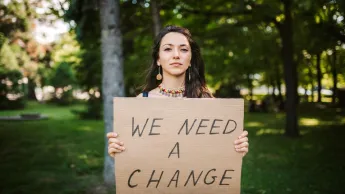“Small steps, big change” – EU Ideas Lab in Poland
- 2020-09-30
- Comment

A productive and exciting weekend in Warsaw – this is what the participants of the EU Lab on sustainability and climate change in early September 2020 had hoped for. But these plans were upset by the corona pandemic. The meeting did not have to be cancelled altogether, however. Participants met online for two days in an intensive EU Ideas Lab that provided plenty of opportunity for reflection.
Socio-ecological restart for the economy
The DAAD Poland organised the Ideas Lab “Small steps, big change” with 14 DAAD alumni and researchers from the fields of environmental science and ecology. As such, participant motivations were diverse: for some, the issue of environmental protection is important in their day-to-day lives, while others wanted to focus on it more as part of their work. The team at the DAAD Warsaw Office selected the focus on “Sustainability and Climate Change” from among eight potential Ideas Labs topics, which included democracy in Europe, migration, and the digitalisation and transformation of the economy. It is one of the goals of the German EU Council Presidency to draw the attention of EU Member States to environmental issues and – besides fighting the corona pandemic – to create a socio-ecological restart for the economy.
Participants started the Ideas Lab by watching the film , the latest production by American documentary film-maker Jonathan L. Ramsey, who lives in Warsaw. The documentary shows the effects of environmental change and climate change in Poland, as well as being a portrait of 62-year-old Polish atmospheric physicist Professor Szymon Malinowski. The renowned scientist and ecology specialist has made it his life’s work to educate the public about the impending climate catastrophe. The Director of the Department of Geophysics at the University of Warsaw, he is often accused in public of being too pessimistic. Ramsey decided to make the film after seeing the scientist on television.
Emotional approach to complex issues
In the question and answer session with alumni, Ramsey said he wanted to show what it was like to be a scientist in Poland. He said that the topic of climate change was rather neglected in the media, so how could you talk about it? “We have to reach people emotionally,” says Ramsey. Communicating scientific findings is costly and time-consuming, he says: “We don’t have the time for that – climate change is happening fast.” This is where art comes in, according to Ramsey: artists are able to respond more quickly. Instead of giving complicated lectures, they can concentrate on an emotional approach that would encourage people to respond more quickly.
Giving young people a voice
The aim to give a voice to young people who wish to do something for the world around them. Protecting the environment is something that affects everyone: we can all have an impact on our immediate environment by taking responsible decisions, for instance. Virtual models can be used to illustrate very clearly how much a bicycle saves as compared to a car, for example.
Marcin Gerwin, an expert in sustainable development and democracy and representative and coordinator of “The Citizens’ Assembly” – which he has also written a book about – spoke about how to mobilise citizens to create an actively involved society. How does the concept work? Participants are chosen at random and represent a cross-section of society. Independent coordinators provide them with the necessary information on specific topics, and they gain a deeper understanding through meetings with experts on both the theoretical and practical side. Municipalities can later agree to tackle local problems in this way.
Creating good starting conditions
Are there consequences if one of the participants in the citizens’ council gets out of line in discussion? “That hasn't happened yet,” says Gerwin. “If people feel they’re being taken seriously, they’re more likely to accept other people’s opinions. The citizens’ council is there to create sound starting conditions – not exercise control. At the end of the two-day programme, participants competed against each other to develop a pro-ecological campaign for social media in two groups. The winning project was a plan to use alternative communication channels to encourage people to use bicycles instead of cars: after all, social media challenges have become the most effective way to raise awareness of environmental protection and sustainability. Popular hashtags such as , an appeal to buy only second-hand goods for 30 days, and #zwlasnymkubkiem, an initiative against coffee-to-go cups, promote sound habits and are good for the environment.
